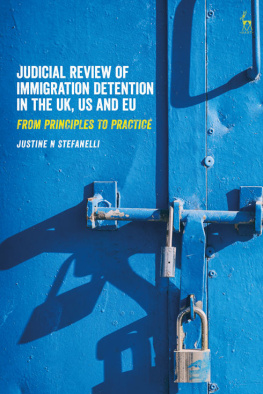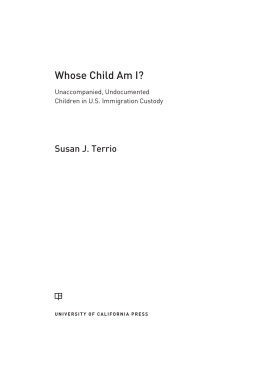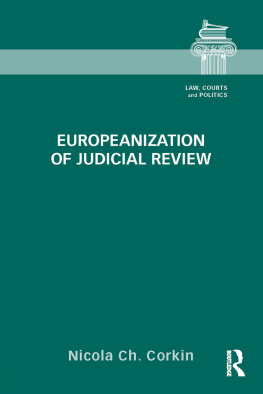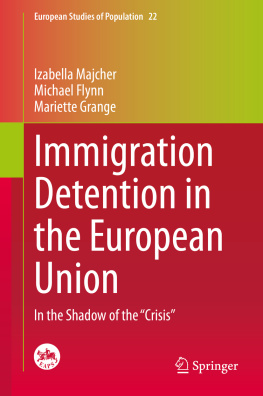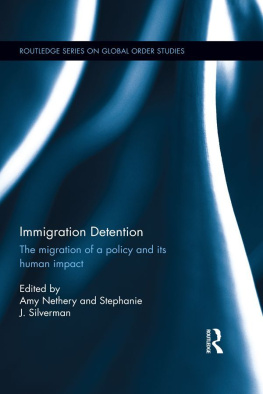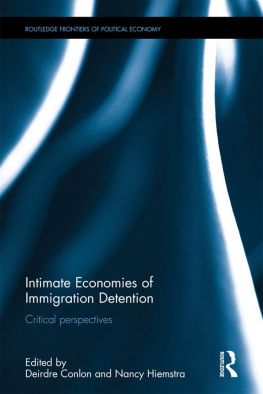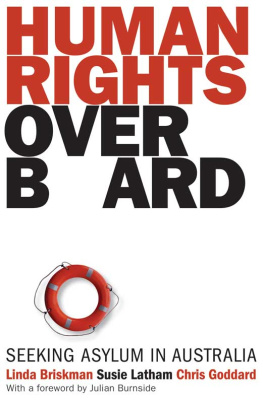Justine N Stefanelli - Judicial Review of Immigration Detention in the UK, US and EU
Here you can read online Justine N Stefanelli - Judicial Review of Immigration Detention in the UK, US and EU full text of the book (entire story) in english for free. Download pdf and epub, get meaning, cover and reviews about this ebook. year: 2020, publisher: Bloomsbury Publishing, genre: Politics. Description of the work, (preface) as well as reviews are available. Best literature library LitArk.com created for fans of good reading and offers a wide selection of genres:
Romance novel
Science fiction
Adventure
Detective
Science
History
Home and family
Prose
Art
Politics
Computer
Non-fiction
Religion
Business
Children
Humor
Choose a favorite category and find really read worthwhile books. Enjoy immersion in the world of imagination, feel the emotions of the characters or learn something new for yourself, make an fascinating discovery.
- Book:Judicial Review of Immigration Detention in the UK, US and EU
- Author:
- Publisher:Bloomsbury Publishing
- Genre:
- Year:2020
- Rating:5 / 5
- Favourites:Add to favourites
- Your mark:
- 100
- 1
- 2
- 3
- 4
- 5
Judicial Review of Immigration Detention in the UK, US and EU: summary, description and annotation
We offer to read an annotation, description, summary or preface (depends on what the author of the book "Judicial Review of Immigration Detention in the UK, US and EU" wrote himself). If you haven't found the necessary information about the book — write in the comments, we will try to find it.
Judicial Review of Immigration Detention in the UK, US and EU — read online for free the complete book (whole text) full work
Below is the text of the book, divided by pages. System saving the place of the last page read, allows you to conveniently read the book "Judicial Review of Immigration Detention in the UK, US and EU" online for free, without having to search again every time where you left off. Put a bookmark, and you can go to the page where you finished reading at any time.
Font size:
Interval:
Bookmark:
JUDICIAL REVIEW OF IMMIGRATION DETENTION
IN THE UK, US AND EU
Immigration detention is considered by many states to be a necessary tool in the execution of immigration policy. Despite the apparently key role it plays in immigration enforcement, the law on immigration detention is often vague, especially in relation to determining the circumstances under which prolonged detention remains lawful. As a result, the courts are frequently called upon to adjudicate these matters, with scant legal tools at their disposal. Though there have been some significant judgments on the legality of detention at the constitutional level, the extent to which these judgments have had an impact at the lower end of the judiciary is unclear. Indeed, it is the lower courts which are tasked with judging the legality of detention through habeas corpus or judicial review proceedings.
This book examines the way this has occurred in the lower courts of two jurisdictions, the UK and the US, and contrasts this practice not only in those jurisdictions, but with judgments rendered by the Court of Justice of the European Union, a constitutional court at the other end of the judicial spectrum whose judgments are applied by courts and tribunals in the EU Member States. Although these three jurisdictions use similar tests to evaluate the legality of detention, case outcomes significantly differ. Many factors contribute to this divergence, but key among them is the role that fundamental rights protection plays in each jurisdiction. Through a forensic evaluation of 191 judgments, this book compares the laws on detention in the UK, US and EU, and makes recommendations to these jurisdictions for improvement.
To my husband, who spent many early mornings with me
and gave me endless support while I turned my research into
a book worth publishing, and to my parents my heroes
Judicial Review
of Immigration Detention
in the UK, US and EU
From Principles to Practice
Justine N Stefanelli

Children are fascinated by medieval dungeons from which there was no means of escape or hope of release. We reassure them that the oubliette the place where people are forgotten is a thing of the past. We tend to forget that many thousands of immigrants over 27,000 in the United Kingdom alone are in administrative detention today. How can they be assured that they are not forgotten? How can we avoid a situation in which the expression administrative detention becomes no more than a disingenuous euphemism for arbitrary imprisonment without trial, contrary to our fundamental conceptions of the Rule of Law? The law, and elementary respect for human dignity requires that lawful detention is subject to due process according to known laws impartially administered. This book examines how this is done.
Dr Stefanelli restricts herself to the law and practice of three jurisdictions: the Administrative Court of England and Wales; the District Courts of the United States Second Circuit; and the Court of Justice of the European Union. And she limits herself to cases that are concerned with the lawfulness of continuing detention, as opposed to the lawfulness of the initial decision to detain. This confines the discussion within manageable limits, while ensuring exhaustive and penetrating analysis within those limits.
England and Wales and the United States are countries of the common law, sharing the heritage of Habeas Corpus and the Rule of Law. In both jurisdictions there is an abundance of case law on the practice of administrative detention. But a divergence of approach has developed over the years for two main reasons. First, the law-makers have reacted in different ways to the inflow of immigrants and to the public demand for greater control. Second, the courts have differed in the extent to which they defer to the exercise of administrative discretion.
In addition, the courts of England and Wales must now take account of European law: the European Convention on Human Rights, interpreted by the European Court of Human Rights, and the law of the European Union, interpreted by the Court of Justice notably the so-called Return Directive on the return of illegal immigrants to their home country. Although the case law is less abundant, it illustrates the way in which courts with international jurisdiction set about forging a common approach for the national courts of States that have very different legal traditions and historical background.
I highly commend this book to those who are interested in how the law works and what can be done to make it work better.
David Edward
Edinburgh
3 September 2019
Directive 2008/115/EC of the European Parliament and of the Council of 16 December 2008 on common standards and procedures in Member States for returning illegally staying third-country nationals.
A.V. Dicey Law and Public Opinion in England, Lecture XI, Judicial Legislation, (Macmillan 1905 and subsequently), page 364 in the 1926 reprint.
This book, and the PhD that served as its basis, were an absolute joy for me to write so much so, that Ive mourned completing the book and having to leave these cases behind. But I could not have done this alone. The reality is that many people academically and emotionally contributed to this labour of love. I am foremost deeply indebted to my PhD supervisors, Professor Valsamis Mitsilegas and Professor Elspeth Guild. I have been consistently impressed by their wealth of knowledge and blessed by their innovative and enthusiastic input into my research. They made my experience an absolute dream, and I will be eternally grateful to them for encouraging me not only to embark on a PhD, but to turn my thesis into a book. I could never have imagined that both processes could be so enjoyable.
I am grateful to the team at Hart, especially Sasha Jawed, who helped bring this book to life, and to Chris Myers, who meticulously edited its text. I would like to thank the judges and lawyers who took the time to speak to me about their work and help me refine my writing with a clearer and more accurate picture of practice, particularly Csar Cuauhtmoc Garca Hernndez, Professor Kees Groenendijk and Nicholas Nason. A special thank you goes to Giuseppe A Ippolito, Esq, Deputy Clerk to the Hon Hugh B Scott at the Western District Court of New York, who was instrumental in helping me to understand NY federal law and practice, and who I can now call a friend. I would also like to thank a number of people at the British Institute of International and Comparative Law, where I was employed for most of the time while I was conducting my research in particular, Professor Robert McCorquodale, Professor Sir Jeffrey Jowell KCMG QC and Sandra Homewood. Their encouragement, support and understanding made juggling a full-time job with a PhD far less daunting than I had imagined. I am also indebted to Dr Lawrence McNamara, who provided me with brilliant advice on a regular basis, when he did not need to at all. Finally, I would be remiss if I did not thank my friends in the USA and the UK, particularly Alexa, Bart, Eva, Hannah, Kristin, Lois, Martyna, Mary, Sally and Zak for their emotional support and cheerleading. My greatest thanks go to my parents for their love and support (and not discouraging my pursuit of yet more research!), and my husband, who never let me doubt myself.
Table of Contents
AEDPA | Antiterrorism and Effective Death Penalty Act |
BIA | Board of Immigration Appeals |
CEAS | Common European Asylum System |
CFR | Code of Federal Regulations |
Font size:
Interval:
Bookmark:
Similar books «Judicial Review of Immigration Detention in the UK, US and EU»
Look at similar books to Judicial Review of Immigration Detention in the UK, US and EU. We have selected literature similar in name and meaning in the hope of providing readers with more options to find new, interesting, not yet read works.
Discussion, reviews of the book Judicial Review of Immigration Detention in the UK, US and EU and just readers' own opinions. Leave your comments, write what you think about the work, its meaning or the main characters. Specify what exactly you liked and what you didn't like, and why you think so.

